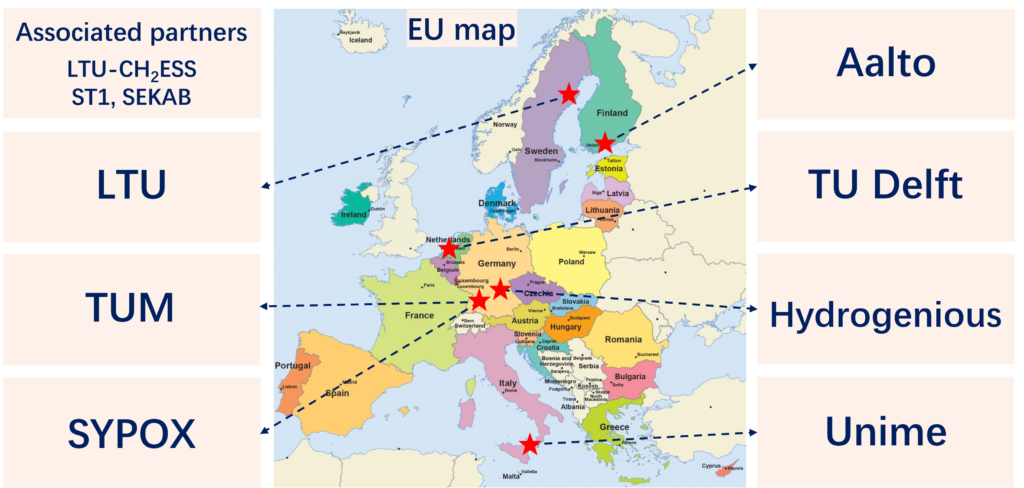Consortium

Partners

LTU has a long history and expertise in biomass conversion to fuels and energy from lab- to pilot-scales, where intensive research has been conducted on IL-based technologies, including electrochemical methods, from fundamental theoretical modelling and lab-testing to process simulation, evaluation, and assessment. CH2ESS was launched at LTU in 2021. In EPOCH, LTU will perform modeling to identify promising ILs as well as process and impact analysis (including LCA), and function as a bridge between EPOCH and CH2ESS. Link to the LTU
Ichiro Minami (Professor in the Division of Machine Elements, Workpackage 6 Leader, Executive Board)
Xiaoyan Ji (Professor in the Division of Energy Science, Workpackage 7 Leader, Executive Board)
Fredrik Granberg (Project manager in the Division of Energy Science and TVM Green Fuels Operation, Workpackage 8 Leader, Executive Board)
Guo Huang (PhD student in the Division of Energy Science)
Zhida Zuo (PhD student in the Division of Energy Science, Secretary)

TUM is a global leader in catalyst development for the conversion of biomass into biofuels. The team has been exploring fundamental aspects of important catalytic reactions, which combine in-situ characterization of catalysts and catalytic processes with advanced kinetic analysis and the design and synthesis of catalysts with multiple functions. Over the past decade, TUM has developed electrocatalytic reactions for the conversion of biobased chemicals. Within EPOCH, TUM will focus on (high pressure) electrocatalytic reduction (loading) of LOHCs in close collaboration with Aalto. This will include the kinetic evaluation of cathode reactions, especially under high pressure and biphasic conditions, and the characterization of critical properties of catalysts under operating conditions. Link to the TUM
Johannes A. Lercher (Professor of Chemistry and member of the Catalysis Research Institute at the TUM as well as Director of the Institute for Integrated Catalysis at the Pacific Northwest National Laboratory, Richland, USA, Workpackage 1 Leader, Executive Board) Link to Technical Chemistry II
Ruixue Zhao (Researcher of Catalysis Research Center and Chemistry Department)
Yue Ma (Postdoctoral researcher of Catalysis Research Center and Chemistry Department)
Siyuan Huang (PhD Student of Catalysis Research Center and Chemistry Department)

SYPOX is an early-stage startup that offers new reactors to directly electrify thermochemical processes. The technologies rely on a simplified design viable for both small-modular and big-centralized steam reformers and crackers. Link to the SYPOX
Gianluca Pauletto (CEO and co-founder, Workpackage 5 Leader, Executive Board)

Aalto presently coordinates the EU Horizon 2020 EHLCATHOL aiming at catalytic solvolysis of enzymatic hydrolysis lignin to fuel molecules and upgrading the product to high-quality commodity fuels, such as jet fuel and gasoline blends. The team has been leading in biomass chemical refining and electrochemical reactor designs, such as non-aqueous redox flow battery, (photo)electrochemical water splitting, and anode total oxidation reactors. Aalto is committed to the EPOCH device integration & validation at TRL 4 as well as bioLOHC and anode development. Their recently developed reduced TiO2 nanotube arrays with remarkable activity will be used as the basis to develop cathodes for achieving high selectivity of LOHC. Link to the Aalto
Yongdan Li (Professor of Chemical and Metallurgical Eng., Workpackage 4 Leader, Executive Board)
Reetta Karinen (Senior University Lecturer of Chemical and Metallurgical Eng.)
Jiaqi Wang (PhD student of Chemical and Metallurgical Eng.)
Marzieh Bagheri (PhD student of Chemical and Metallurgical Eng.)

TU Delft has strong expertise in heterogeneous catalysis, reaction engineering, and operando spectroscopy. Over the past decade, Delft has researched PEM electrolyzer systems and electrocatalyst development for hydrogen production as well as for direct hydrogenation of various molecules at the cathode. Delft has successfully employed operando X-ray absorption and Raman spectroscopies to understand catalyst structures in PEM electrolyzers. Such expertise and experiences will be brought to EPOCH. Link to the TU Delft
Atsushi Urakawa (Professor of Catalysis Engineering at Department of Chemical Engineering, Workpackage 3 Leader, Executive Board) Link to Urakawa Group
Ezgi Demiröz (PhD student of Catalysis Engineering at Department of Chemical Engineering)

Hydrogenious is a world SME leader in LOHC business area. It will be involved in the analysis of the logistic aspects of LOHC as well as in the definition and study of LOHC. Its work will be centered on: 1) the impact analysis for electrochemical and biogenic LOHCs loaded by electrochemistry; 2) analysis of electrochemical cycling of loading, de-loading, chemical analysis of potential LOHCs and impurities in these cycles; 3) provision of target LOHCs in the quantities needed. Link to the Hydrogenious
Christin Hummel (Technology Manager, Executive Board)
Stephanie Maerten (Funding Managerin)

Unime is a well-recognized developer of catalysts and electrocatalytic solutions, involved (also coordinating) various projects in the area (DECADE, OCEAN, TERRA) and in various EU projects dealing with the electrocatalytic conversion of biobased chemicals or other electrocatalytic reactions (TERRA, PERFORM, etc.). The activities in EPOCH will focus on the development of anodes and anodic reactions to convert biobased molecules deriving from lignin. The activities will combine materials and electrodes development, electrode and cell engineering, advanced characterization of the electrocatalysts and their testing and ranking. Link to the Unime
Gabriele Centi (Professor of Industrial Chemistry, Workpackage 2 Leader, Executive Board) Link to Catalysis and Sustainable Process Group
Siglinda Perathoner (Professor of Industrial Chemistry)
Georgia Papanikolaou (Junior Researcher (RTD-A))
Paola Lanzafame (Associate professor of Industrial Chemistry)
